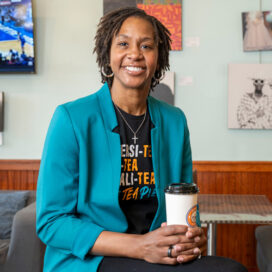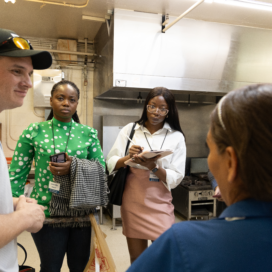From Gina to ‘The Machine-a’
Published: February 11, 2019 / Author: John Nagy
What stepping into the boxing ring taught ND MBA student Gina Guzzardo
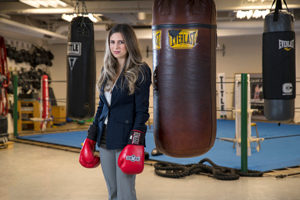 At some point, someone shared with Gina Guzzardo this piece of wisdom from boxing legend and unwitting business professor Mike Tyson: “Everybody has a plan until they get punched in the mouth.”
At some point, someone shared with Gina Guzzardo this piece of wisdom from boxing legend and unwitting business professor Mike Tyson: “Everybody has a plan until they get punched in the mouth.”
You laugh because it’s true, and you figure when it happens you’ll know what to do, she says. “And then someone’s punching you.” And you forget everything.
Guzzardo, a first-year Notre Dame MBA student, knows from experience. There she was, set to spar for the first time as a member of Notre Dame’s Women’s Boxing Club, stepping into the ring with a sophomore, an undergraduate maybe 10 years younger and, she admits, quite a bit faster than her. Before she knew it, the 5-foot-5-inch former professional dancer and paralegal — no stranger to gloves and hooks and jabs after taking boxing classes for fitness while working in New York City — had absorbed four quick punches to the face.
She’d thought she was ready, but only then did it click: “You are supposed to be hitting that girl in the face right now.” This wasn’t about snapping at mitts or laying into heavy punching bags anymore. “I was like, all right, you need to hit her back. This is what you’re doing. It’s a sport.”
Tyson’s observation was hardly the only thing Guzzardo will take away from her transformative first semester of studying marketing at Notre Dame’s Mendoza College of Business and competing in the 16th annual Baraka Bouts. But the sport’s lessons about endurance, discipline and handling adversity may prove among the most memorable. And the most useful.
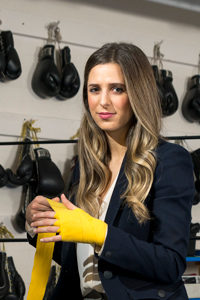 When the Michigan native arrived in South Bend last August, the bouts were the furthest thing from her mind. Wondering what she’d do for exercise, she came across the boxing club, known for its team mentality, its support of the Congregation of Holy Cross missions in East Africa and its grinding workouts.
When the Michigan native arrived in South Bend last August, the bouts were the furthest thing from her mind. Wondering what she’d do for exercise, she came across the boxing club, known for its team mentality, its support of the Congregation of Holy Cross missions in East Africa and its grinding workouts.
So she rounded up a few classmates, each of whom tried one training session in September and bowed out. Guzzardo stuck with it, taking to heart the admonitions of second-year students and staff advisers to “get out of Mendoza” and seek out the full Notre Dame experience whenever she could. She found new ways each week to work four 90-minute practices into the already stiff demands of her life as a graduate business student.
Jabs and crosses weren’t the only things thrown at her through October and into November.
There were the workouts themselves, high-intensity intervals of one or two minutes designed to simulate the rhythms of a round in the ring. Pop.
There was the surprising but genuine curiosity of her classmates when she announced a Five Guys fundraiser to support the Bouts’ 2018 mission to build a cafeteria at a school in Uganda. Pop.
There was Mission Monday, an afternoon of soaking autumn rain when two boxing club members reported on their visit to that school, where students eat lunch outdoors — rain or shine. BANG.
That’s when Guzzardo knew she was all-in. “If you remembered you were doing it for a reason,” she recalls, “that helped you push through.”
The team spirit of Baraka Bouts, the largest women’s boxing club in the United States (with more than 300 dues-paying members, it’s also larger than the Bengal Bouts), helped, too.
“We don’t use the f-word,” says Nate Walker (’02), coach of both the women’s and men’s clubs. “They’re not fights.”
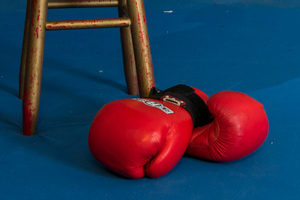 They’re bouts, competitions, athletic performances. Safety comes first, he says, in the form of fitness, stringent medical protocols and the clubs’ humanizing ethos. This isn’t Tyson versus Holyfield. Boxers get to know each other before they so much as spar. The priestly blessing before a bout reminds athletes that, whatever comes next, they’re in it together.
They’re bouts, competitions, athletic performances. Safety comes first, he says, in the form of fitness, stringent medical protocols and the clubs’ humanizing ethos. This isn’t Tyson versus Holyfield. Boxers get to know each other before they so much as spar. The priestly blessing before a bout reminds athletes that, whatever comes next, they’re in it together.
“People who can be humble and not know it all, they succeed,” Walker adds. That was Gina. She brought maturity, life experience and positivity to the season.
Before she knew it, Guzzardo had become Gina “the Machine-a.” She had no trouble selling more than the 10 tickets required of each boxer. But she didn’t exactly broadcast her first-round matchup with an undergraduate, another Baraka Bouts rookie. She was nervous and didn’t know what to expect, other than that her mother and sister were coming down from Detroit. She didn’t expect the cheering section from Mendoza. And she didn’t expect to win.
But she did.
That was a Tuesday night. The following Saturday she was a bridesmaid, relieved simply not to have any facial injuries in her friend’s “forever-memorialized wedding photos.” Two nights later she was back in the ring, facing a sophomore business amidst the stress of midterm exams.
This time she wasn’t nervous. She was an underdog, and she was having fun.
Her Mendoza cheering section was larger. And louder. And “the Machine-a” lived on to fight another day.
That meant a potential conflict. Thursday, Nov. 15, was the night of Mendoza’s annual internship showcase, a chance to meet prospective companies. The boxer arranged to have her match scheduled as late as possible. “I was kind of in a crazy state of mind, but I think it definitely left an impression on the few companies I spoke to,” she says.
She recalls dashing out the door around 7:45 p.m. for her 9:10 p.m. bout — against a club captain. “Underdog” was an understatement.
“I’ve learned two things,” says Joseph Holt, the professor who taught Guzzardo’s business ethics class and attended all three nights of the 2018 tournament. “Never try to out-fight Gina Guzzardo. And never try to out-shout her supporters.”
Guzzardo’s classmates followed her over from the internship showcase, about four dozen twenty-somethings showing up en masse in their best business suits.
Chants of “Gi-NA! Gi-NA!” thundered through the Dahnke Ballroom in the Duncan Student Center from the first bell. Dan Wilborn, a Bengal Bouts captain who was in the other corner that night, says the crowd was so loud that neither he nor his boxer could make themselves heard.
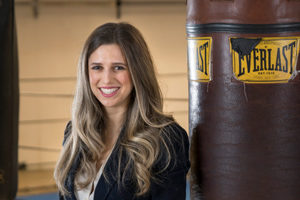 “I almost sort of felt bad for my opponent,” Guzzardo recalls. That feeling passed. Maybe it was replaced with the sense of what her courage in the ring was doing for her classmates — an unintended benefit of her out-of-the-ordinary extracurricular.
“I almost sort of felt bad for my opponent,” Guzzardo recalls. That feeling passed. Maybe it was replaced with the sense of what her courage in the ring was doing for her classmates — an unintended benefit of her out-of-the-ordinary extracurricular.
“It was great to have their support,” she says. “And when I did get tired in the third round, their support just invigorated me.”
Holt says he hasn’t felt that good after a sporting event since watching the “Miracle on Ice” at the 1980 Winter Olympics.
Guzzardo has added a simple line near the bottom of her resume. “Women’s Boxing Club, Baraka Bouts.” It’s a conversation starter, she says.
She left out one word after thinking it over, though, because to her it wasn’t as important as the teamwork, the experience, the mission, the lessons learned from getting punched in the mouth. But “the Machine-a” has a new nickname around the halls at Mendoza. She still hears it, pretty much every day. “Champ.”

